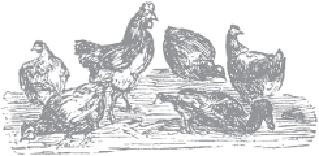Agriculture Reference
In-Depth Information
7
Laying Chickens
RAISING CHICKENS FOR
the purpose of producing eggs dates back several thousand years.
Prior to using chickens, native peoples from all over the world would gather the eggs of
wild birds to eat. Many feel the egg is the perfect source of food. It is high in protein,
with nutrition concentrated in a very small space. Because chicken eggs are a delicious,
versatile food that appeals to people all over the world, their source—laying hens—are
highly valued and sought after by poultry raisers on farms large and small.
Past and Present Layers
A laying chicken is a type of chicken raised mainly for the purpose of laying eggs. Al-
though the meat on these birds is of edible quality, for most people, the primary goal of
raising a layer is to have a bird that produces lots and lots of eggs.
Nearly 100 percent of the eggs found in grocery stores or supermarkets come from
laying chickens on factory “farms.” On these gargantuan facilities, thousands to millions
of hens are kept in small cages, with food and water provided continuously. Their eggs
roll onto a conveyor belt and are transported to where they are washed, cooled, and pack-
aged for send-off to the consumer. Egg quantity and size are certainly the primary focus
of these facilities, frequently to the detriment of the birds' health.
In contrast, until the middle part of the twentieth century there were countless farms
all across America with laying hens in buildings that typically housed between five hun-
dred and two thousand birds. The children and women of the household often tended to
the flocks, then sold the eggs to earn spare “egg money.” These flocks were kept for one
or two laying cycles, and then sold to someone who would butcher them to be sold as
stewing hens.
Those practices are part of our American heritage; however, it now seems doubtful
that they will ever recur, even in our rural landscape. In today's society, egg sales are
highly regulated. Each state has its own rules and regulations regarding the sale of eggs.

